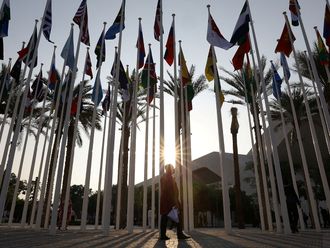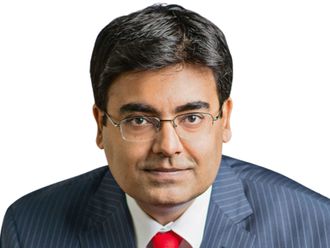For oil producers, April is not "the cruellest month of the year" as T.S. Elliot said with oil prices rising to levels unseen since October 2008. Prices for the Opec basket rose from almost $77 (Dh282.59) per barrel at the beginning of the last week in March to as high as $84 per barrel on April 26. Although prices fell back to $82 per barrel two days later, the average for April is over $82 per barrel as compared to $77.21 per barrel for March.
What a way to start the second quarter where demand is usually the lowest in the year and prices often soften. Oil demand in the second quarter could well be one million barrels a day (mbd) lower than that of the first quarter. Therefore, the price appreciation may be called contra-seasonal. It is not the first time for this to happen but it is usually rare.
Appropriate price
The desired range of $70 to $80 per barrel as described by the Saudi oil minister as "the most appropriate price" is also shared by ministers of the International Energy Forum (IEF) which met last month in Cancun. But this range seems to be slipping and the calls for Opec to do something to curb the rise in prices are likely to increase. Some Opec ministers have said that Opec will intervene if oil prices rise to $100 per barrel while others will be too happy to raise the range by $5 per barrel. In fact even some industry sources desire higher oil prices. The US oilfield service firm Baker Hughes needs oil prices at least around current levels of $86 per barrel for projects to continue as reported by Reuters.
One month's performance is not enough to judge the course of oil prices but there is no escape from the fact that prices have risen from $46 per barrel in March 2009 to the level of $82 per barrel in April 2010. Opec has indirectly acted to curb the rise in oil prices by not being too perturbed about its members' discipline with respect to agreed production levels. Opec surplus production capacity is now over 6 million barrels per day and world oil stocks are much higher than the last five years' average and rising. Therefore, any official increase in the level of Opec production ceiling is unlikely this year if the supply-demand situation remains as it is expected now.
So what is driving this market? Increased demand from China, India and the Middle East and the general perception that demand is on an upward path due to an improved prospect for economic recovery has been cited as the main reason for price appreciation. The IMF raised its forecast for world economic growth in 2010 to 4.2 per cent, compared with a January projection of 3.9 per cent. Also the World Bank sharply raised its forecast for economic growth in East Asia to "reflect reviving global demand, sustained fiscal and monetary stimulus and a rapid rebound in consumer spending".
Growth expectations
East Asia excluding China is expected to grow by 5.2 per cent, up from a previous forecast of 4.5 per cent while China's forecast is kept at 8.7 per cent. The only fear on the economic front is the financial turmoil in Greece but the market seems to have discounted this issue as it is widely felt that the European Union and IMF are going to provide the necessary packages to salvage the situation.
All the above factors are probably not sufficient to justify the price rally, which prompted many people in producers and consumers circles to revisit the issue of speculation in the futures market. According to a Reuter's poll, speculative activity in the crude oil futures market has boosted prices above the level dictated by supply and demand where some put the boost by $10 to $30 per barrel.
Opec recently reported that a "record 2.5 billion barrels of ‘paper oil' traded on the world's two main futures exchanges on 13 April" or "the equivalent to roughly 29 times the volume of oil used around the world each day". Many Opec ministers also cited the futures market and welcomed the attempts of the United States to limit trading positions.
The IEA chief Nobuo Tanaka said recently that "Opec, the IEA and the IEF have developed a plan to address oil market volatility" when he was referring to the discussions related to the futures market in Cancun and also those recently held in Tokyo by the three organisations.
But for these efforts to produce results, time is needed and governments are not united on this issue and they are slow to legislate especially when the speculators are big banks and financial institutions that will do anything to stop or at least delay any meaningful legislation.
Let us wait for developments in May but nothing dramatic is expected to happen.












